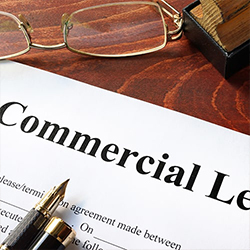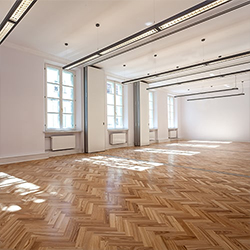

Whether you are a seasoned restaurateur looking to expand your operations or a first-time entrepreneur venturing into the foodservice industry by starting a restaurant, understanding the key aspects of leasing a restaurant is essential. Leasing a restaurant offers numerous benefits, such as flexibility in location selection, lower upfront costs compared to purchasing, and the ability to focus financial resources on other aspects of the business, like equipment and marketing. Below, we fully explore the advantages and considerations of leasing a restaurant, helping you make an informed decision for the future of your business.
Use these links to learn more about individual aspects of leasing a restaurant.In general, there are four different types of commercial leases. They are known as gross leases, net leases, percentage leases, and variable leases. Each type determines which costs are covered by you and which are covered by the building owner. To learn more about each lease type and which one could be the best fit for you, continue reading below.

With a gross lease, the tenant pays a flat monthly fee, and they're not responsible for maintenance, utilities, or any other operational costs. Instead, these costs are built into the monthly rent, which protects the lessee from any unexpected costs.
A net lease involves a lower flat monthly fee, but, unlike a gross lease, the tenant is responsible for some of the costs of operation. These costs can include property taxes, janitorial services, utilities, and insurance. When negotiating a net lease, be sure to discuss your exact financial responsibility so you don't get stuck with unexpected bills after signing a contract. There are three different types of net leases, including:
Under a percentage lease, the lessee pays a fixed rental rate as well as a percentage of their business’s profits. In most cases, lessees aren’t required to pay a percentage of their profits until they reach a certain income level. This type of lease can be beneficial both for the landlord and the lessee. The lessee gets the advantage of having a low fixed rate as they establish their business, while the landlord can make more profit in the long run if the business occupying their commercial space becomes profitable.
Variable leases come in two forms: index leases and graduated leases. An index lease varies based on an index, typically the consumer price index or the local rental market. For example, if the local rental market's prices go up, then the leased rental price rise with them. A graduated lease changes based on a pre-set schedule. The rate at which the lease changes can be negotiated and arranged in different ways depending on the lessee and the landlord’s preferences.

Once you have found the perfect space for your new restaurant, it's time to meet with the landlord and lawyers to draw up a contract. Don't hesitate to ask questions and suggest changes when coming up with a lease agreement.
The details of a lease can vary depending on a variety of different factors. Below, we've listed some common considerations to take into account as you negotiate your lease:
Looking for a commercial location for your foodservice restaurant is an important step that requires knowledge about leasing options and how to negotiate a lease with your landlord. We hope you use our guide to sign the best lease option for your business, so you can dive into the fun part of starting your new business: designing a kitchen layout, buying equipment, hiring staff, and furnishing your dining space.

While owning your restaurant space can be beneficial, it’s not always the best option for new businesses. Studies show that buying your building will only pay off if you plan to stay in the same spot for over 7 years. New restaurants cannot predict what their business will need in 7 years. For example, your business could be so successful that you need to move to a larger space, or you may want to target a different neighborhood in your city. To make sure your business can continue to grow and meet your clientele where they are, we recommend that new businesses lease their space because it provides greater flexibility.
Depending on the circumstances and type of restaurant you're opening up, there are some alternatives to buying or leasing a restaurant space.
Leasing a restaurant space can be a cost-effective way to enter the industry and establish your brand without the hefty upfront costs associated with purchasing a property. However, navigating the leasing process can be complex and daunting, especially for first-time restaurateurs. To help you make informed decisions and secure the right lease for your business, consider the following tips:

If you encounter financial hardship or discover that the terms of your lease aren't working for you, it's possible to restructure your lease. By contacting your landlord and explaining the situation, you may be able to come to an agreement that is beneficial for both parties. However, this process can seem confusing to those who haven't done it before. To renegotiate your lease, adhere to the following steps:
The terms of commercial leases vary widely. Before entering into a conversation with your landlord, make sure you fully understand your lease agreement. While we don’t suggest opening the conversation with this, it is good to know what leverage you have.
Reach out to your landlord in a formal, yet non-confrontational manner. If you feel it is necessary, hire an attorney and have the attorney reach out to your landlord’s attorney. Here are a few tips for achieving a desirable outcome:
Once a clear understanding of each parties’ struggles and current capabilities is established, you and your landlord can come to a fiscally feasible compromise for restructuring your lease. Educate yourself on common lease restructuring strategies before entering into negotiations.
Common lease restructuring strategies include:
After you and your landlord have verbally agreed upon a mutually feasible means of restructuring your lease, you will need to document the changes in an official lease amendment by following these steps:
While needing to restructure a lease is not ideal, sometimes restaurants in difficult financial positions are required to. By entering into a conversation with your landlord, you can avoid losing your commercial property, filing bankruptcy, or embarking on a costly legal journey after defaulting on your lease.
Leasing a restaurant space is a significant decision that can have a substantial impact on the success of your business. By carefully considering factors such as location, lease terms, and financial implications, you can make an informed choice that aligns with your business goals. Remember to negotiate favorable terms and and thoroughly review the lease agreement before signing. Much like leasing restaurant equipment, leasing a restaurant can be a strategic investment that allows for increased financial flexibility and sets your business up for long-term success with the proper planning.
The information provided on this website does not, and is not intended to, constitute legal advice. Please refer to our Content Policy for more details.

How to Create a Profitable Patio Space
Whether your restaurant is located in a warm climate year-round or you want to take advantage of the weather, a patio can be an excellent addition to

How to Buy a Restaurant
When entering the restaurant business, aspiring entrepreneurs have multiple avenues to explore. You can start a restaurant from the ground up and navi

Restaurant Location Analysis
There are many factors to consider when starting a restaurant, and location is one of the most important. Location analysis requires you to investigat